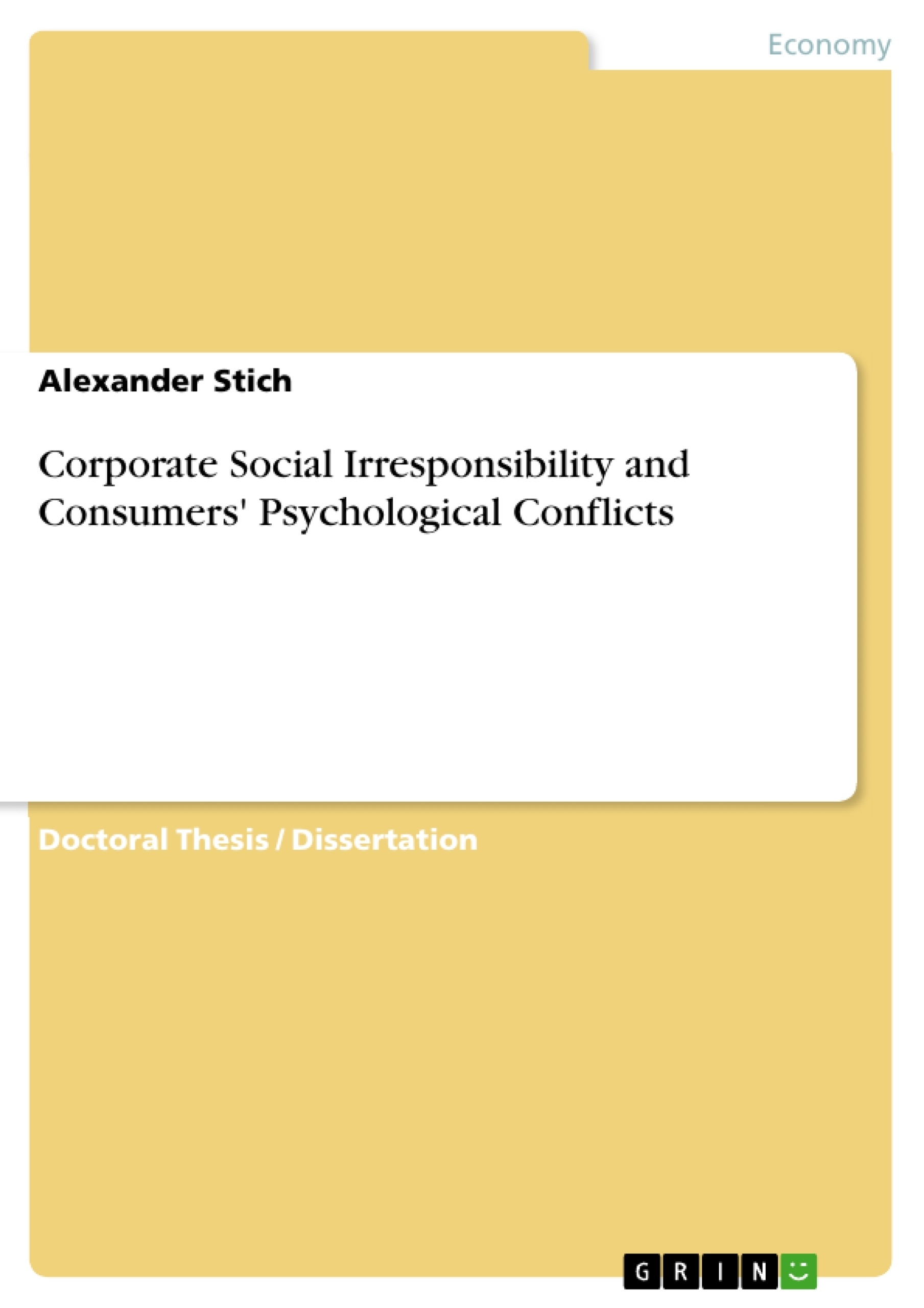The three papers together follow the overarching research question how corporate social irresponsibility (CSI) and consumers’ psychological conflicts are connected.
First, Paper 1 describes a literature analysis, building the basis for Paper 2 and Paper 3, specifically, to understand the terminology and theoretical properties surrounding CSI as well as corporate social responsibility (CSR). The most important (abstract) ethics-related terms (e.g., CSR, green consumption, sustainability) used in the marketing ethics literature are therefore examined. The question which terms are used to which extent in influential marketing journals and how they relate to each other constitutes the basic research question of Paper 1 (‘Contemporary Usage of Marketing Ethics Terminology: A Concept Analysis’).
Second, Paper 2 (‘Fooling Yourself: The Role of Internal Defense Mechanisms in Unsustainable Consumption Behavior’) then exploratory addresses the role of consumers’ inner conflicts in the field of unsustainable consumption behavior – and in case of their indirect support of CSI behavior – by means of 20 in-depth interviews.
Third, Paper 3 (‘Cling Together, Swing Together? Corporate Social Irresponsibility: Do Consumers Feel Accountable for It?’) experimentally investigates the specific causal relationships of particular consumer conflicts on the basis of their perceived degree of moral responsibility.
Inhaltsverzeichnis (Table of Contents)
- Introduction
- Contemporary Usage of Marketing Ethics Terminology: A Concept Analysis (Paper 1)
- Transition between Paper 1 and Paper 2
- Fooling Yourself: The Role of Internal Defense Mechanisms in Unsustainable Consumption Behavior (Paper 2)
- Transition between Paper 2 and Paper 3
- Cling Together, Swing Together? Corporate Social Irresponsibility: Do Consumers Feel Accountable for It? (Paper 3)
- General Discussion
- References
- Affirmation – Statutory Declaration
Zielsetzung und Themenschwerpunkte (Objectives and Key Themes)
This dissertation examines the relationship between corporate social irresponsibility (CSI) and consumers' psychological conflicts. It explores the terminology and theoretical frameworks surrounding CSI and corporate social responsibility (CSR) through a literature analysis, investigates consumers' internal conflicts related to unsustainable consumption behavior through in-depth interviews, and experimentally analyzes the causal relationships between consumer conflicts and their perceived moral responsibility in relation to CSI.
- Understanding the terminology and theoretical framework of corporate social responsibility (CSR) and corporate social irresponsibility (CSI)
- Investigating the role of consumers' internal conflicts in relation to unsustainable consumption behavior
- Examining the causal relationships between consumer conflicts and their perceived moral responsibility in relation to CSI
- Developing a conceptual framework for marketing ethics terms based on frequency of use and interrelations
- Analyzing the use of ethical terms over time and across different marketing outlets
Zusammenfassung der Kapitel (Chapter Summaries)
- Introduction: This chapter provides an overview of the three papers included in the dissertation, outlining their logical order and their contribution to the overarching research question: how corporate social irresponsibility (CSI) and consumers' psychological conflicts are connected.
- Contemporary Usage of Marketing Ethics Terminology: A Concept Analysis (Paper 1): This paper explores the terminology surrounding CSR, CSI, sustainability, and business ethics through a literature analysis. It examines the frequency of use of different terms and develops a conceptual framework of marketing ethics terms based on three dimensions: abstraction, appeal, and subject. Major definitions of relevant ethics-related concepts are provided, with a focus on marketing ethics as an umbrella term encompassing CSR, corporate social performance (CSP), CSI, and sustainability.
- Fooling Yourself: The Role of Internal Defense Mechanisms in Unsustainable Consumption Behavior (Paper 2): This paper explores the role of consumers' internal conflicts in relation to unsustainable consumption behavior through 20 in-depth interviews. It focuses on understanding how consumers reconcile their personal values with their participation in activities that may contribute to CSI.
Schlüsselwörter (Keywords)
Corporate social responsibility (CSR), corporate social irresponsibility (CSI), marketing ethics, consumer behavior, unsustainable consumption, psychological conflicts, moral responsibility, internal defense mechanisms, ethical terms, conceptual framework.
Frequently Asked Questions
What is Corporate Social Irresponsibility (CSI)?
CSI refers to corporate behaviors that are perceived as unethical or harmful to society, often serving as the opposite of Corporate Social Responsibility (CSR).
How do consumers react to CSI?
Consumers often experience internal psychological conflicts when their personal values clash with their consumption of products from irresponsible companies.
What are "internal defense mechanisms" in consumption?
These are psychological strategies consumers use to "fool themselves" and justify unsustainable behavior or participation in CSI-related activities.
Do consumers feel morally responsible for corporate actions?
The dissertation experimentally investigates the causal relationship between consumer conflicts and the perceived degree of moral responsibility they feel for CSI.
What is the role of marketing ethics terminology?
The study analyzes terms like green consumption and sustainability to understand how they are used in influential journals and how they relate to the concept of CSI.
What methodology was used in Paper 2 of this dissertation?
Paper 2 utilized 20 in-depth interviews to explore the role of consumers' inner conflicts in unsustainable consumption behavior.
- Quote paper
- Diplom-Psychologe Alexander Stich (Author), 2018, Corporate Social Irresponsibility and Consumers' Psychological Conflicts, Munich, GRIN Verlag, https://www.grin.com/document/496200



